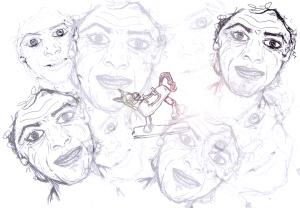
Artwork by Kami Anderson
The undercover reporter sits up in bed and reaches, or rather fumbles, for the notepad on the bedside table. His heartbeat is a mixture of delicacy and forcefulness, like a moth trapped in a clenched fist. He writes the following sentence:
My sordid existence has defiled my honest intentions. I went in search of truth as I live a lie…
He stares at the ceiling and shakes his head, then turns the page. He has now reached the final page in the notebook. He writes:
I hate who I am.
In my heart of hearts…
His train of thought is interrupted when he realises that he doesn’t know what the phrase ‘heart of hearts’ actually means. It sounds like a schizophrenic playing card, he thinks. He tries to recapture his thought process but finds it too hard, because a woman is talking about mirrors on the radio – a stupid subject for the radio.
He longs to go back to writing fiction. Had he known the seedy depths he would have sunk to when entering a life in the murkiest shadows of journalism he would have turned and fled. But right now there is only the radio lady and her mirrors. He clenches his fists and thinks he feels the fluttering of moths.
He walks naked to the window and opens it to get some air. The building opposite is a mirror image of the one he is in. The window directly across momentarily frames a human silhouette. He strains his eyes, and the shape is gone.
He looks at his filled notepad and then to his laptop, then turns away in disgust. It was never meant to get this far. His wife knows his role but doesn’t know who he is. He is a secret that exposes the city’s own secrets. This particular news story has hooked him. He relishes his meetings with the girl. Why? It’s disgusting. Yet despite the internal confliction, the self-loathing, the shame he feels when with his family, he continues.
On top of the bedside cabinet is a lamp, which he turns on. In the first drawer is a Gideon’s bible. In the second, deeper drawer is a box containing the children’s game Buckaroo. It is a game he has played with his own children, and he remembers that they have supposedly foolproof methods of stacking the various implements onto the plastic donkey.
He takes out the donkey (or is it a mule? He’s never known) and sets it to the highest sensitivity level, then places the items in a row on the bed. A guitar, a frying pan, a cowboy hat, a shovel: small symbols of hard-earned freedom. There is a stick of dynamite, which, he remembers, should always be attempted last. And there is a coiled plastic rope, which he doesn’t want to think about.
He tries a combination. No luck. The donkey kicks after three items. He tries again and again with varying degrees of success, but like in a recurring nightmare he never manages to fully load the donkey. And of course, like a recurring nightmare, it becomes an obsession for him to complete this most pointless of tasks. The donkey continues to flip and sneer, its old plastic teeth are yellow.
All of a sudden a knock comes at the front door. At first the man doesn’t notice. But when the knock comes again there is no question of not hearing it. It is as if an unstoppable force of nature has arrived. The undercover reporter puts on a dressing gown and opens the door to be greeted by a silhouette, which in a few seconds dims into a man, a man as white as bone. There seems to be no skin on his long, almost equine nose, while in his hand he carries a stick of some kind.
Thomas Blake & James Massoud
